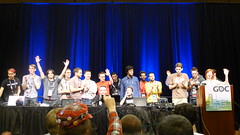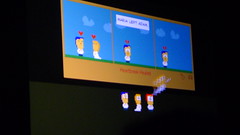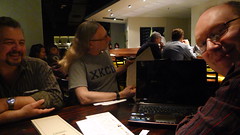This year at GDC i tried a new approach. Previous years I have been so greedy to not miss anything that I have been severely sleep deprived. Being up late talking, but still bouncing up early in the mornings in order to catch the morning talks. My memories became fragmented at best.
So this year I only went for three days instead of five, and I made sure to sleep a bit later if it had been a late evening the day before.
It worked so much better! On the other hand, by this year I have gotten used to that the GDC Vault exists, that I can look at the record talks later, back home. So it isn’t as devastating to miss one of the talks. Also, this year there were no keynotes in the morning, that helped too.
So this year I only went for three days instead of five, and I made sure to sleep a bit later if it had been a late evening the day before.
It worked so much better! On the other hand, by this year I have gotten used to that the GDC Vault exists, that I can look at the record talks later, back home. So it isn’t as devastating to miss one of the talks. Also, this year there were no keynotes in the morning, that helped too.

This means that I went to fewer talks, but I think I still managed to capture some of the highlights. One of my favorites was the Experimental Game Play Sessions that featured ten really interesting games, and another was Richard Rouse’s talk on character and empathy in cinematic game design. He gave two especially interesting examples of how narrative and game play is intertwined. One was that of Sam Fisher in Splinter Cell, when he is betrayed his emotional reaction is conveyed to the player by the ability to shoot with astounding accuracy. There was a familiar feel to this, so when I ran into Richard Dansky later I asked; and yes, indeed he had written that scene. Another interesting example Rouse brought up was that of a game where the player could shift perspective between characters, and where the objects in the world was represented very differently. In one character, the environment appeared grey and hostile, with threatening creatures in it. When switching perspective into a ‘little sister’ the colors of the world were warm and cosy, and the threatening entities were hardly noticeable. To the player, this would explain how the little sisters could appear so unconcerned in the scary environment. That is, the characterization of the little sisters gets an extra dimension since players can take their perspective.

Of the games presented in the experimental game play session I especially appreciated Storyteller and GlitchHiker. Storyteller appears so elegant to me: the player can accomplish a story by simply moving story-elements between three cartoon-looking squares, one for earch act. I associate to Polti’s 32 dramatic situations - there were pre-defined dramatic states that the player can puzzle out by dragging around the entities. Lovely!
The story of GlitchHiker was one of tragedy, loss, and memoriam. The game itself had 200 lives, and player’s loosing would take one of these away. Players could also win lives for the game. The lesser lives left, the more glitches in the game. It lived for 6 hours, and during that time players created strong emotional bonds to the game. All that is left is one video-shot of the game. The story was told in a compelling way - I can’t do it justice here. I really recommend checking out this session in the Vault.

A strange tendency in this years’ rants was to complain about reasoning about games. It is strange to me because no one has ever forced anyone who doesn’t want to, to reason, or listen to reasoning. To make that into a talk (“I don’t want to listen”) seems very meta to me, and somewhat unnecessary. It has more validity when a child in school complains, since schooling is mandatory. GDC is not.
What made this GDC memorable to me was the demos I saw over lunches and dinners. I have this wonderful feeling that now, finally, there are games and systems designed for me. Systems that not just are impressive and interesting, but completely and utterly what I have been longing for. One is Storybricks - Stephane showed it in action over dinner, and I can’t *wait* to get my hands on it to construct stories. Another is Emily Short’s and Richard Evans’ text game based on Austen’s Pride and Prejudice. It is as if a book comes alive. Genius.
I took pictures! Click here for a brief photo-diary.
I took pictures! Click here for a brief photo-diary.

